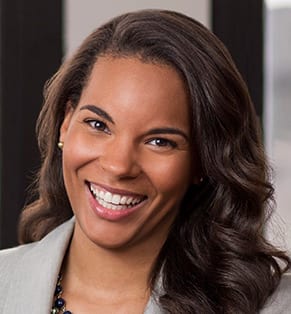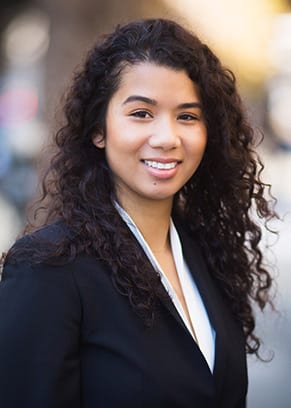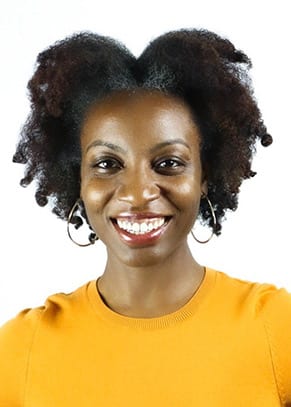By Andrew Cohen
Four recent graduates who became friends at Berkeley Law’s chapter of Law Students of African Descent have launched new businesses that tap into their passions and entrepreneurial spirit.
Demi Williams ’12, Liên Payne ’13, Jazmine Smalley ’13, and Titilayo Tinubu Ali ’13 are each veering outside the conventional lawyer path in unique and gratifying ways.
“We have taken leaps of faith,” Williams says. “Though we each spent time working in traditional roles, we are excited to step outside the box.”
Transition team

As an undergrad at Pepperdine University, Williams discovered her zeal for working with athletes. She tutored student-athletes there, worked with the Texas Christian University Athletics Department, and came to Berkeley to pursue a career in sports law. Although Williams’ love of trials ultimately led to Big Law litigation and an impassioned career as a San Francisco prosecutor, her desire to help athletes never subsided.
In January, she launched The Ready Athlete to prepare student and professional athletes for life after sports. The company eases this transition by offering career services and coaching—to individual athletes and through athletic departments, teams, players’ associations, and leagues.
“I’ve personally known athletes who struggled after leaving professional, collegiate, and even high school athletics, and I’ve heard about many more,” Williams says. “They struggle to find their identity without sports, to obtain meaningful employment without career-readiness skills, and even to determine what type of career to pursue having never considered other passions.”
Williams appreciates how friendships made during law school—including with Payne, Ali, and Smalley—helped motivate her to consider entrepreneurship. She is “proud of how African-American students have been able to thrive at Berkeley Law and after graduation,” noting that five student journals had African-American editors-in-chief last school year and that the Berkeley Journal of Entertainment & Sports Law (which she co-founded) recently had an all-African-American female editorial board.
Taking control

Payne, who co-founded the firm Kennedy Payne, P.C. in December, recalls how her fellow Berkeley Law students “were incredibly outspoken and entrepreneurial—it’s one of the things that makes the school so unique. As a student, I observed my classmates challenge the status quo time after time and learned that if you want to make a change, then do it.”
While working together at a large firm, Payne and Danielle Kennedy decided to heed that advice. Wanting more control over their legal work and “the ability to follow our own strategic instincts on cases instead of following marching orders,” they began discussing alternatives to Big Law.
Payne and Kennedy wanted to implement legal technology tools to help streamline work processes and eliminate unnecessary overhead costs—making their services more cost-effective for clients. Their new firm aims to provide top-tier legal services to Bay Area businesses without the inefficiencies that drive up costs and make traditional large firms inaccessible to smaller companies.
“We also wanted freedom from strict hierarchy—the more hierarchy, the more hands a document has to go through before it gets to a client—which is great for billing, but not great for clients,” Payne says. “For us, being in control of our schedules and how we manage our time is absolutely essential. We decide how many clients to take on at any given time, which means that every client is getting us at our best.”
Family affair

Smalley launched Accuro Corporate Services (ACS)—a growing full-time venture—in January. She started it with her husband, a fellow attorney, and her two sisters now also work for the company. ACS provides self-help, legal document preparation services to small businesses and entrepreneurs, enabling them to represent themselves in uncontested legal matters.
“I found law practice to be taxing so I began considering ways to use my degree in a legal realm without actually having to practice,” Smalley says. “I knew I wanted to do something fun and community-oriented. When I began looking into companies like Legalzoom and Rocket Lawyer, I learned that both companies were founded by top law school grads who had a similar goal.”
ACS has grown faster than anticipated, partnering with registered agents, lawyers, and CPAs across the country to provide more comprehensive business support to clients. She says it is currently the largest African-American owned national legal document preparation firm, and cites plans to set up scholarships, a national conference, and entrepreneurial meet-ups.
“There’s been a 400 percent spike in African-American entrepreneurs and most of our clients fall into this demographic,” Smalley says. Having made “lasting connections with friends” in Law Students of African Descent and the Women of Color Collective, she appreciates how those contacts have generated fruitful client referrals.
Creating her niche

Ali, who ran her own communications firm for seven years before law school, founded Own Your Expertise, a training company and peer community for professionals who aspire to work for themselves.
“After law school, I noticed many of my peers were expected to have business development skills they hadn’t developed in their studies or prior work,” she says. “Many also ultimately wanted to work for themselves, but they didn’t know where to start.” Through Own Your Expertise, Ali—who learned through trial and error how to market and grow her communications firm—seeks to give back and provide the entrepreneurship training she wishes she had.
Having focused her legal career on employment law, Ali recently shifted out of Big Law back into consulting to have more flexibility for her family. “As a wife and mom of twin three-year-olds, I place a high value on my time,” she says. “The great thing about entrepreneurship skills is that they give you options and the power to make choices that align with your values.”
With studies estimating that half the workforce will be freelancing in some capacity by 2027, “we all should be thinking like entrepreneurs,” says Ali, a regular speaker at firms, colleges, conferences, and podcasts. “When professionals gain entrepreneurial skills, they add more value to their workplaces, build their own personal brands, and are often better equipped to work for themselves.”